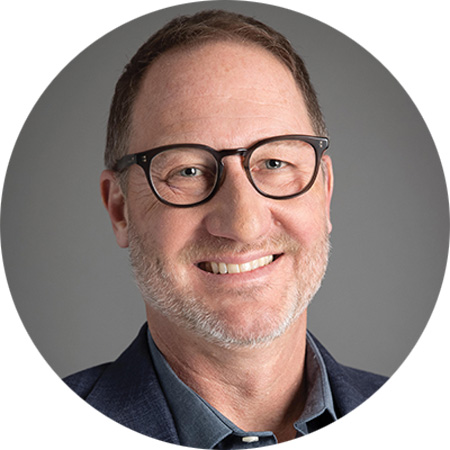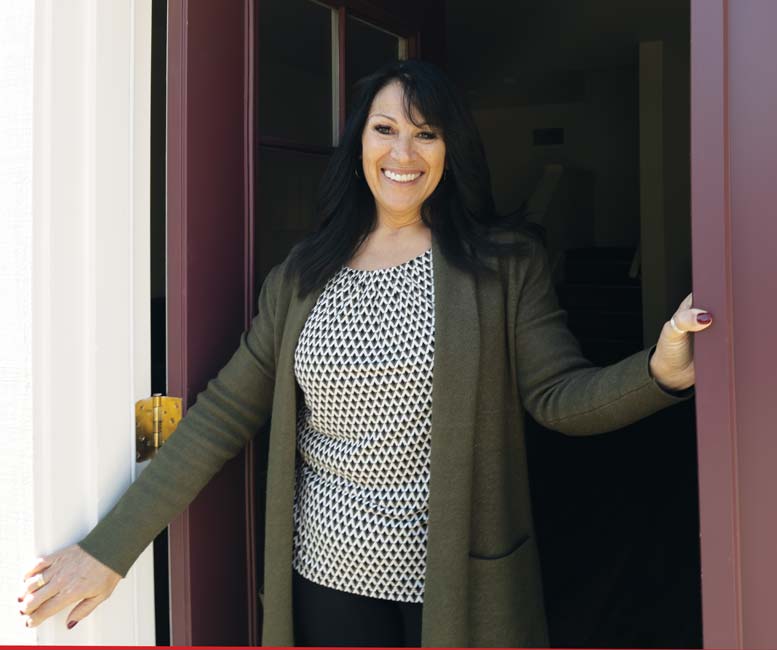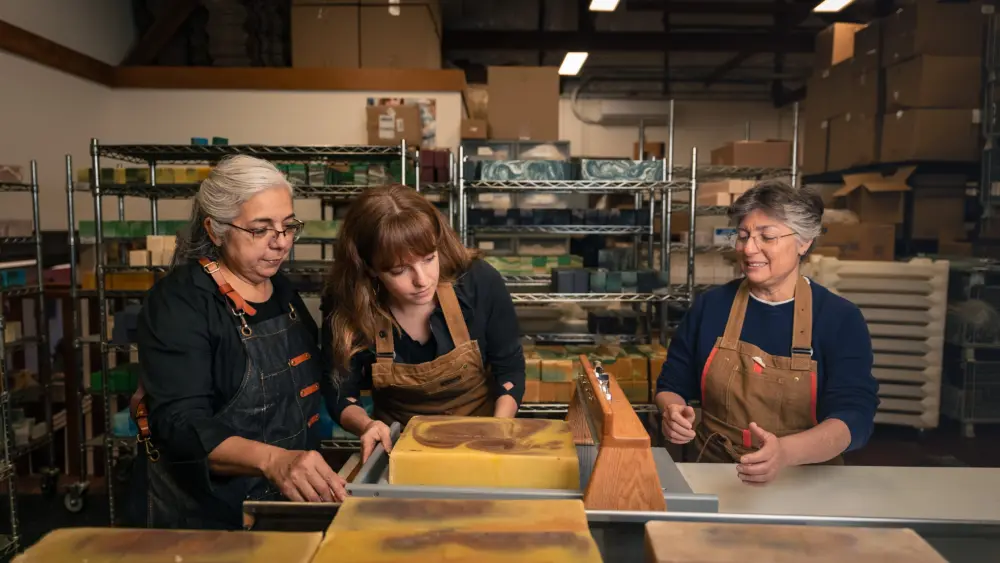
Last year in its annual report, the anti-poverty nonprofit California Human Development (CHD), lamented the “end of an era” for Athena House, CHD’s renowned women’s treatment program, and its sister-sober-living facility Hope Village. Citing post-pandemic low enrollment and rising costs, the local nonprofit wrote that it had made the “painful decision” to shut down its long-term substance recovery services.
This meant that Athena House, which for over 30 years had helped women struggling to conquer substance abuse, and Hope Village’s transitional homes in Rincon Valley, would close by July 2022. The Sonoma County properties that housed the two programs—at Stone House on Sonoma Highway and on Speers Road in Rincon Valley, respectively—would be sold. Athena House officially closed July 29, after its remaining five clients completed their programs. The more than 20 women in the Hope Village sober-living residential program, some with children, would have to find other accommodations.
This was terrible news to the people involved with these life-transforming programs. Athena House supporters and alumnae frantically set about to raise the money to save the programs, but their efforts were coming up short. So, it did seem, and would indeed have been, the end of the era––if a Santa Rosa couple, out of the country on vacation when the news broke, had not read about it in the local paper. What followed was a sequence of pieces and people falling into place that Athena House supporters who had been scrambling to save the program describe simply as, “a miracle,” delivered by, as one of the supporters described them, “angels.”
A need and an opportunity
The vacationing couple, Bill and Cindy Gallaher, had read that two long-standing local residential treatment programs for women were going to be closed down and the property to be sold to the highest bidder. This would mean that recovery services in Santa Rosa would be losing 40 beds from Athena House, and 24 beds from Hope Village. The Gallahers recognized the need and a possible opportunity.
“It’s one of those things,” says Bill Gallaher, when we first talked to him and his wife, Cindy, about how they got involved in the project. “We’ve been really fortunate,” he says. “We’re both from Santa Rosa, both born here––I’m third-generation Santa Rosa––and we’re in a position where we’d like to share a little bit. So, when we looked at this, we thought, this is about investment in people. We can do this.”
“This” was the purchase of the Hope Village property in Rincon Valley that could—with a whole new, re-designed and renovated campus—house both the Athena House treatment program and the Hope Village sober-living program. The timing was right for them both, Cindy says. “We’re at a point where we can pick and choose [where to direct our philanthropy].” Sight unseen, they figured that it would be a big investment. “But it’s an investment that pays off in lives,” she says. “And generations.” So, they were motivated, and they had the means––not only to buy the property, but to make whatever renovations and redesigns were required. On this, they were experienced. For over 40 years, both in Sonoma County and throughout the West, the Gallaher Companies have been developing housing for communities and families; Gallaher’s Oakmont Senior Living company has developed retirement and assisted living facilities across California and Nevada. They say they are committed to fulfilling Sonoma County’s housing needs, but in Sonoma County building housing can be challenging. But the Athena House/Hope Village project was not just about housing. It was about preserving a needed program for vulnerable women and children. The project was right for them. Not that Bill and Cindy knew anything at all about rehabilitation programs. But they have the means and a deep belief in philanthropy. Bottom line, they can make such a project succeed. “We know how to build,” says Cindy Gallaher. “We’ve built thousands of homes,” echoes Bill. But first they had to secure the deal.
Real estate cliff hanger
Time was tight. The deadline for the sale was only days away. There was one buyer in line, and he did not intend to continue the treatment programs. So the fate of all the women who needed the recovery services of Athena House rested with the right buyer––someone who would preserve the programs. “When you see something like this that needs to be done, and nobody’s going to step up, and we can—we have the ability,” says Gallaher. “So we arranged to buy this, really without seeing it. We didn’t know the operations, but we figured we’d find someone.” On reflection, he considers, “You can look at all the excuses––well we don’t know the operations, so we can’t buy it, or we haven’t seen it––or you can just do it. My wife,” he says, “is a doer.” So, they did it.
Gallaher sent Komron Shahhosseini—regional director of site acquisitions and development at Gallaher Companies, and a board member at Poppy Bank, founded by Gallaher—to go check out the Rincon Valley property. Shahhosseini reported back that the property was a mess, really in disrepair, the grounds were stacked with old appliances and mattresses, the buildings, built back in the 1950s, were ramshackle and moldy. It was clear the nonprofit programs had been barely making do. The buildings would have to be replaced or considerably refurbished. The Gallahers had to act fast. Says Gallaher: “We made an offer, sight unseen, and were under contract before we came home from vacation.” The purchase closed in August 2022 for $2.1 million.
But who would run the programs?
Flash back. When California Human Development decided to close Athena House, frantic supporters rallied to raise money to save it. But since the program did not have its own 501C—which can allow tax-deductible donations—they needed a fiscal sponsor. Enter the Marin-based Buckelew Programs, an organization founded in 1970 to bring a “whole person approach” to people with substance use/mental health challenges. Chris Kughn, Buckelew’s CEO, saw the need and arranged for Buckelew to be Athena House’s fiscal sponsor. He worked with alumna and former Athena House program director Sylvie De La Cruz and her fellow alumnae Jasmine Palmer and Brooke Igleheart Ross in their efforts to raise money and appeal to local officials to help save the programs. Their efforts fell short, but by the time Bill and Cindy Gallaher came into the picture and were looking to see who might run the programs, they were impressed with Kughn and the team already in place and asked that Buckelew operate the programs.

“At the time,” says Gallaher, “we didn’t have a partner [in operating the programs]. Buckelew has their own business, and we have ours, but we’re partnering. And we think we’ve got absolutely the best guys to operate it. We’re so thrilled.” He says that given the state of operations when Athena House closed down, he was inclined to offer Buckelew a trial period. But after meeting Kughn and his people, and seeing their passion and dedication, he was filled with confidence—and the terms with Buckelew are for an indefinite rental, at the princely sum of $1 per year.
Meanwhile, Kughn already had his program director in mind: Sylvie De La Cruz. So now the team was assembled to bring the Athena House program back to life. Can the rebuilt Hope Village avoid the problems of the past? Kughn is confident.
Before, the Athena House and Hope Village programs were conducted on separate properties, incurring separate expenses, with the Stone House rent and upkeep becoming increasingly expensive. Now, with both programs on the same campus—with all-new and refurbished buildings—and virtually no rent to pay, funding needs can be seen in a new light. And next year, predicts Kughn, the picture will look even better. “Our funding source is from the county contract and MediCal,” he says. And, Kughn adds, in July 2024, Sonoma is going to become a “waiver county”—meaning fuller reimbursements for MediCal programs.
Meanwhile, like all nonprofits, he’ll be looking to do some “gap funding.” The plans, on paper and already materializing on the property, are eliciting excitement among stakeholders.
A custom-built campus with a healing theme
For Kughn, the beautiful thing with this project is that, like the women who will come here to change their lives, the property and the program are both getting a whole new start. “We get this wonderful opportunity that rarely comes around, that you actually get to design something based on the program itself. So, there’s that intentionality of design,” says Kughn. This takes a lot of careful listening on the part of the owner/builder, so that what gets constructed really does serve the mission of the programs. “We know building,” says Gallaher. “We don’t know the programming at all. But we take pretty good direction, and we listen, really listen, to what they need.”
Stepping into the newly refurbished buildings, one sees new floors, new walls, new trim, fresh paint, clean lines, views from the windows, a fireplace, kitchens big enough for the 16 residential clients, with large stainless double sinks, double windows and two refrigerators. (There has to be enough storage for people to arrange their own food, says Bill Gallaher about the double-fridge setup.) “We wanted a really nice area, and separate study and meeting rooms,” Gallaher says. “All of the bedrooms have their own bathrooms. All with plenty of closet space.” Walking through, there’s a sense, not of some institutional housing, but a real home—where a group of people will be able to live, study, rest, talk, cook, eat and, in some cases, with children in tow. All these things are part of the program, and now they are part of the campus design. “Those are the things they told us they needed,” says Gallaher. “And we kept going back to them saying, does this work?”
Sylvie De La Cruz describes the Gallahers’ contributions to the project as “next level.” She appreciates that they’re both eager to learn. “Cindy called me and said, ‘I want to know more.’ She wanted some books and has done her own research. So, it’s more than just doing what they’re doing, it’s that they’re learning what is involved in the services we’re going to provide.”
A place of security and self-respect
Everything the Gallahers and Buckelew are planning is aimed toward providing an atmosphere conducive to healing and well being of the women who reside there. That means, clean, safe, well-designed bright new or renovated buildings with brand new furnishings and attention to the spaces both inside and out that encourage gathering or play or quiet time. The right design sets the tone. “It gives a clear message,” says Cindy, “and the women there will tell you that if they’re allowed to live in a dump, where things are not repaired and broken appliances are sitting around, there’s mold—how important can you feel?”
The working philosophy of the project is that to nourish self-respect, people need to feel that their community values them. Traumatized women especially need to feel secure in the place where their work on themselves is centered. To live in a place that’s thoughtfully designed and furnished––with access to nature and places for sharing with peers and playing with children—helps establish the feeling that you’re important. Here, these women residents will be safe in their own community. “The foundation of that community is that they all support each other,” says De La Cruz.

The plans include two main residences (one for adult women and one for adult women and kids), a group therapy building, a community center with detached classroom and auxiliary buildings. In addition to the buildings, the plans include landscaped paths that wind among the well-designed buildings and around other outdoor amenities: a basketball court, a group therapy room, a courtyard for sitting outside, a pickleball court, a playground for kids. And, for those who not only like eggs but enjoy a bit of country living––a chicken house and run. The neighborhood itself is quiet and conveniently located within the larger neighborhood—with safe areas that women can walk, sit, visit, rest, study and enjoy as part of their program.
“They are literally building us a sanctuary and a safe environment for the entire programming piece,” says De La Cruz. “I don’t know how to tell you how important that is for all the women who come in,” she says. “All of them, 100 % of them, have had trauma. So to have such an incredible environment is essential to their healing.”
De La Cruz says the women served by the programs are particularly moved by the prospect of a new campus.
“They’ve seen the plans and they’re more than overwhelmed,” says De La Cruz. Changing the simplest personal habit is hard enough for most people, so one can imagine how hard it is for women—many with children and struggling with various addictions—trying to completely turn around their lives. “What they’re doing is hard, hard work,” says De La Cruz. “They’re not all successful, and they need a tremendous amount of support in order to make it.” As a former Athena House program graduate, De La Cruz knows. She’s been there. Her own gratitude shines in her eyes. “This is the best thing that’s ever happened to the program, and to me,” she says. “Buckelew has opened my eyes to a whole other way to how an agency treats its employees and its programs.”
“I didn’t know him before this happened,” says Chris Kughn of Bill Gallaher. “But he and Cindy have been phenomenal.
“As Bill says, he has the means, and we can do this. So, it’s been like a miracle.”
Kughn concedes he had doubts the program could be saved.
“We didn’t think this would happen,” Kughn says. “Something truly came together to make this happen—a constellation of Sylvie and her team, and all the alumnae of Athena House rallying and political people and the Gallahers coming in.
“It was just an incredible sequence of events.”
What Women Want
The 2020 survey of the Commission on the Status of Women reports that the top issues for Sonoma County women include:
- Lack of affordable healthcare and low-income housing
- Lack of access to quality, affordable childcare
- Lack of mental health services
Concerns changed slightly within different income brackets. Women with more substantial incomes were concerned with the issues above and also retirement issues. Women with incomes less than $20,000 per year, which made up 9% of the population surveyed, also identified substance abuse/addiction as additional issues.
The report summarized as recommendations, that women would benefit from community centers or “gathering places” where they could exchange information, give and receive support and even possibly receive training.
Search for Voices of Sonoma County Women 2020 at sonomacounty.ca.gov.
Athena House alumna named Sonoma County Woman of the Year
Rep. Mike Thompson, in a March 1 statement before U.S. Congress, named Athena House graduate Brooke Igleheart Ross his Sonoma County Woman of the Year and praised her for her excellent work in the community. “Ms. Igleheart is a prominent member of the business and recovery communities and is deeply passionate about supporting others who have overcome alcohol and substance-abuse challenges. She is an outstanding figure in our community, helping those who struggle with substance abuse to reintegrate into the workforce.”
Brooke Igleheart Ross struggled with alcohol in her early life and had been to other programs, all private and expensive, but none had worked for the long term. By the time she came to Athena House, she recognized that she needed and was ready to change her life and that this was the program for her. “Athena House was an environment I’d not experienced before,” she says. “I learned to let go of shame and to be honest with myself and who I was.”
She praises Athena House counselors and staff, “and their passion and experience working with people with all kinds of addiction.” After she successfully completed the program, she continued in their aftercare program and started volunteering, got a job in sales, and little by little built a successful career and family life. “I just did it one day at a time,” she says. “I progressed in my career and moved up the ladder.” She is now director of sales and marketing at a hotel in Healdsburg, has a real estate license, and is on the board of directors of Buckelew Programs.




One thought on “Athena House of Santa Rosa: A New Lease on Life”
Good day my name is Urleane Navarro I’m a student in the SRJC addiction study program I m reaching out to your program for a a possibly of internship I heard that you are reopening this program I would love a chance to work within this program I have heard so many wonderful things about this program I would love to part of this new chapter I know that this opportunity would be so amazing. Thank you Urleane Navarro